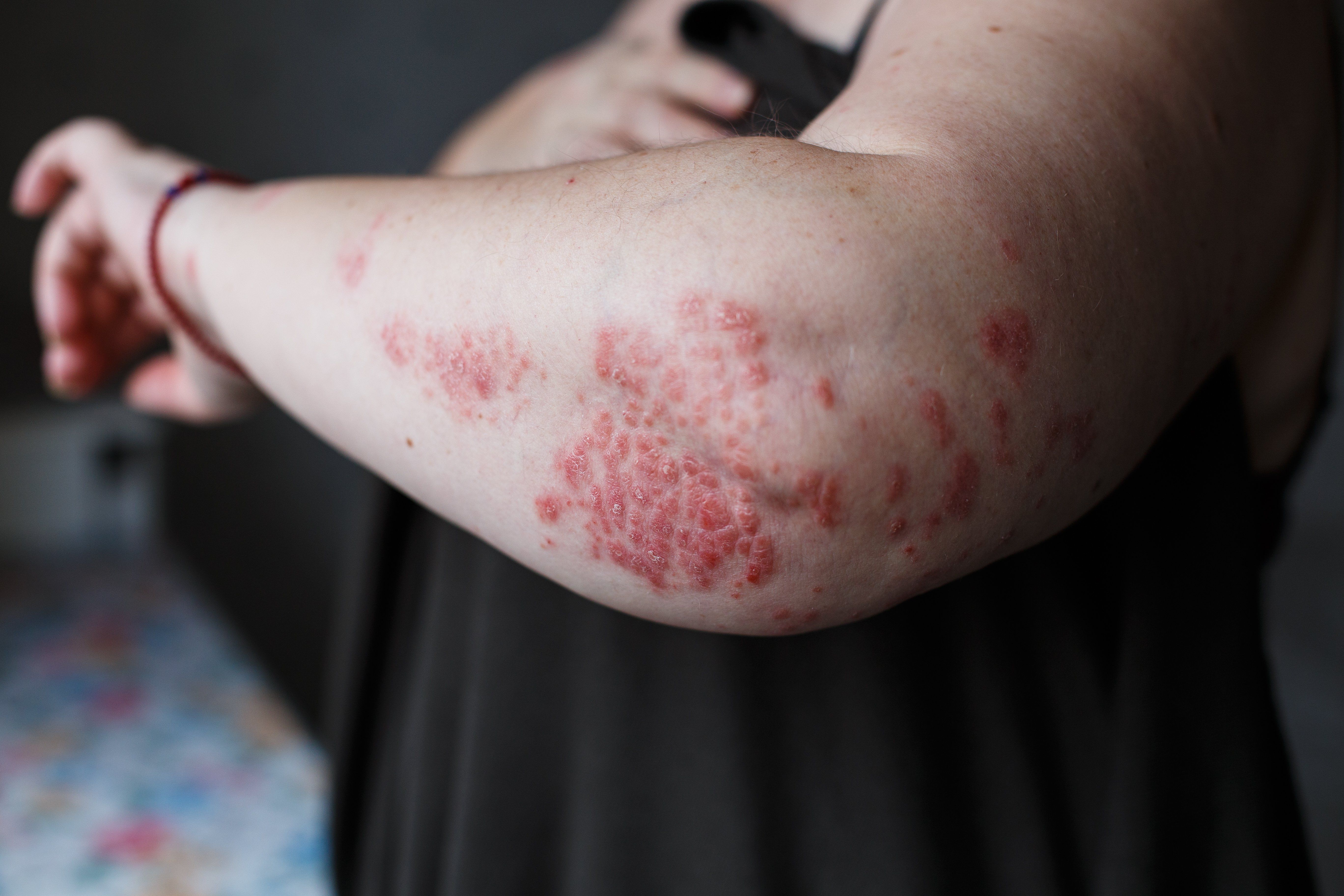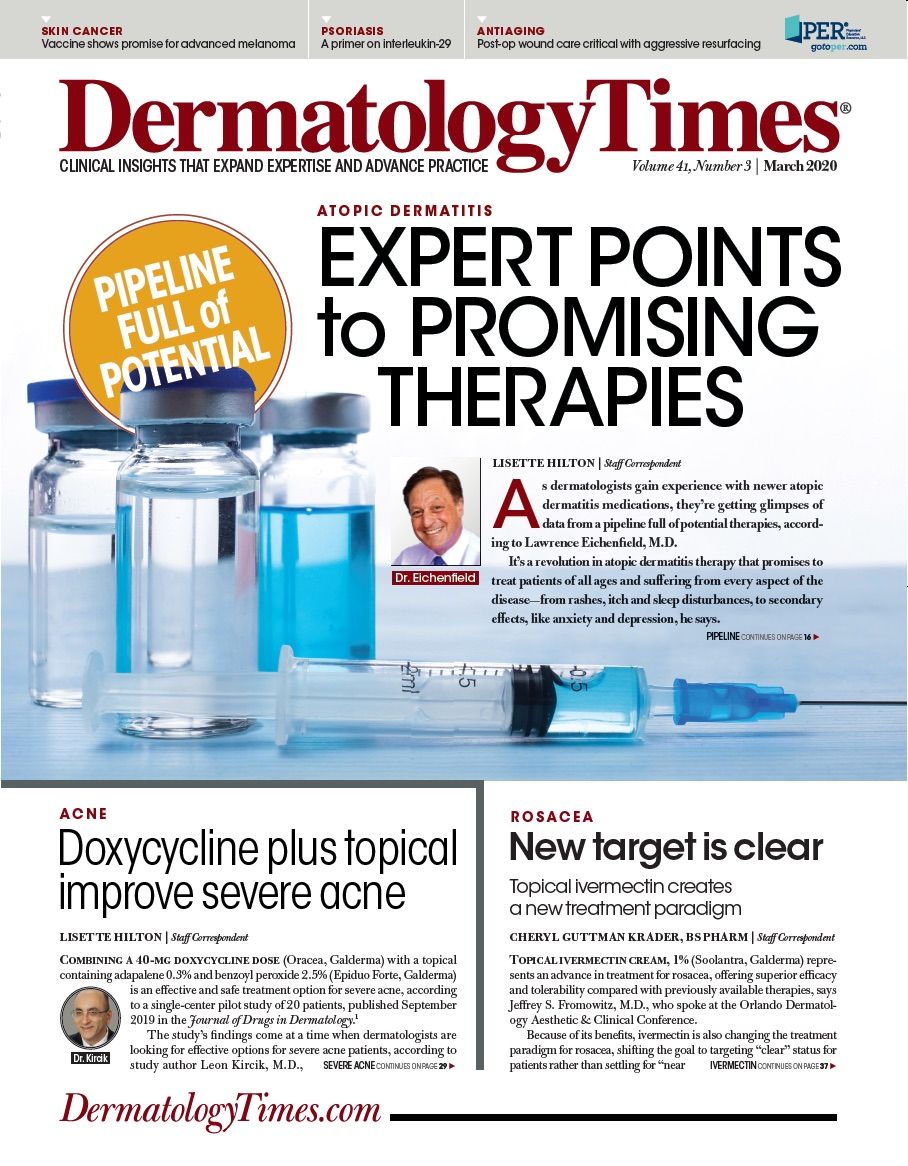- Acne
- Actinic Keratosis
- Aesthetics
- Alopecia
- Atopic Dermatitis
- Buy-and-Bill
- COVID-19
- Case-Based Roundtable
- Chronic Hand Eczema
- Drug Watch
- Eczema
- General Dermatology
- Hidradenitis Suppurativa
- Melasma
- NP and PA
- Pediatric Dermatology
- Pigmentary Disorders
- Practice Management
- Precision Medicine and Biologics
- Prurigo Nodularis
- Psoriasis
- Psoriatic Arthritis
- Rare Disease
- Rosacea
- Skin Cancer
- Vitiligo
- Wound Care
Publication
Article
Dermatology Times
Anti-TNF therapy efficacy differs by gender
Author(s):
A study showing differences in baseline characteristics between responders to anti-tumor necrosis factor (anti-TNF) therapy and insufficient responders may be helpful to dermatologists as they consider treatment for patients with moderate-to-severe psoriasis, according to the investigators.

A study showing differences in baseline characteristics between responders to anti-tumor necrosis factor (anti-TNF) therapy and insufficient responders may be helpful to dermatologists as they consider treatment for patients with moderate-to-severe psoriasis, according to the investigators.
RELATED: Guidance on transitioning psoriasis patients between biologics
The research analyzed data from patients enrolled in the Corrona Psoriasis Registry. In an adjusted analysis, female gender was the only baseline characteristic that was independently associated with a decreased likelihood of achieving a response to anti-TNF therapy at six months. However, a number of other imbalances were noted at enrollment between the responders and patients who had an insufficient response to anti-TNF therapy. The investigators suggested that awareness of these differences may help clinicians identify patients with moderate-to-severe psoriasis whose needs may not be met by an anti-TNF agent and who, instead, may benefit from a different approach to care and/or a biologic with a different mechanism of action.
Providing information to explain the background for conducting the study, researchers note that anti-TNF agents are often used as first-line biologic treatment for psoriasis. In addition, it is common for patients to be switched to another anti-TNF agent if they do not respond adequately to the initial therapy. They wrote, “Switching or discontinuing anti-TNFs has significant implications for clinical and economic outcomes in patients with psoriasis; therefore, real-world studies that characterize patients on the basis of response to therapy would provide valuable information to help healthcare providers.”
To conduct a “real-world” study, they extracted data from the prospective Corrona Psoriasis Registry, which enrolls adults diagnosed with psoriasis by a dermatologist who started or switched to and continued a systemic or biologic agent within the previous 12 months that has an FDA-approved indication for treating psoriasis.
Patients were included in the analysis if they had moderate-to-severe disease, defined as affected body surface area (BSA) ≥3%, entered into the registry between April 2015 and June 2018 upon starting anti-TNF therapy, and had at least one six-month follow-up visit. Patients were identified as insufficient responders if, at six months, their affected BSA was ≥3% or improved <75% from baseline. Patients who had discontinued or were switched from their initial anti-TNF agent were also classified as insufficient responders.
Data were included for 180 patients who were nearly equally comprised of insufficient responders (89 patients, 49.4%) and responders (91 patients, 50.6%). The two groups were compared for demographic characteristics (age, gender, race, ethnicity, body mass index) and baseline disease-related and clinical variables (duration of psoriasis and psoriatic arthritis, comorbidities, Investigator’s Global Assessment, BSA, Psoriasis Area Severity Index, and prior use of biologics) as well as patient-reported outcomes from a variety of questionnaires.
RELATED: An update on psoriasis topical therapies
In the statistical analysis that adjusted for baseline differences, females were approximately 50% less likely to achieve a response to anti-TNF therapy compared with males (odds ratio = 0.534, 95% confidence interval = 0.289 to 0.988; P=.046). The researchers note that there have been few previous studies investigating differences in response to anti-TNF agents based on patient gender.
However, they identified two previous papers-one involving patients with psoriasis and another analyzing data from patients with psoriatic arthritis-that also reported better response in males than females.
Of the differences found at registry entry between the responders and the insufficient responders in the unadjusted analysis, the investigators say that it was particularly notable that the anti-TNF responders reported better dermatology-related quality of life and according to the data collected by nearly all of the other patient-reported outcome tools, were slightly less impaired by their psoriasis.
Identifying small sample size and short follow-up duration as limitations of their study, researchers call for larger studies to better characterize significant differences between anti-TNF responders and insufficient responders.
References:
Van voorhees AS, Mason MA, Harrold LR, et al. Characterization of insufficient responders to anti-tumor necrosis factor therapies in patients with moderate to severe psoriasis: real-world data from the US Corrona Psoriasis Registry. J Dermatolog Treat. 2019;Oct 3:1-8.

























